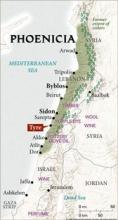In Chapter 4 of The Song of Songs we learn a lot more about Rayati, specifically that she lives in Lebanon. We must remember the era in which The Song was written before we can understand the implications of this. Modern scholars have dated the text to approximately 900 BCE, though its exact date would determine much of its influence. If it was written prior to 875 BCE, The Song would have come from the height of the Phoenician Empire when the region known as Lebanon was a cultural powerhouse. If it came after 875, it would have been born in a highly contentious period when Assyrian Greeks conquered much of the region and began oppressing the local population considerably. The city of Tyre, then a major sea port and the most important economic city in southern Lebanon, was one of two to rebel against the Assyrians and would have been the closest major city to Rayati's home, provided she didn't live in Tyre itself (or possibly the city of Dor which was nearest to the Israeli border).
Regardless of whether The Song was written prior to Assyrian rule or during it, Rayati's status as a woman of Lebanon has major implications for both the literal and allegorical readings of the poem. Most strikingly, if The Song of Songs is supposed to be a metaphor for God's love for Israel or its people, then Dodi's pursuit of Rayati implies a divine mandate for either the capture of Lebanon by the kingdoms of Israel and Judah or at the very least a call to all foreign Jews to leave their homes and establish themselves in the Holy Land. That Chapter 4 finds Dodi once again enumerating Rayati's many merits and comparing them to wonders both natural and man-made would mean that this call to domination or immigration is not just a matter of love, but of resource. This only makes sense, as ancient Lebanon was the jewel of the Levant. The city of Byblos is the oldest continually inhabited city in the world, Beirut has been a thriving metropolis for millennia and Lebanon's natural bounty gave rise to a people with such power and influence that they even conquered the political titan that was Egypt. As an increasingly pervasive cultural and military power, the twin kingdoms of Israel and Judah would have sought to seize the city-states of Lebanon just like the Assyrians, Babylonians, Persians, Macedonians and Romans did.
Taken as just a love story, Rayati's Lebanese heritage is no less important. At the time the people of Lebanon were ethnically Canaanite and many of them, especially those in the south, would have been Jewish or of a proto-Judaic faith so the love between Dodi and Rayati wouldn't have been a scandal. However, her position as a Phoenician would have undoubtedly made Rayati the more worldly, educated and impressive of the two. In an alternative allegorical reading, Rayati can be seen as the alluring influence of the Phoenician culture on the Jewish people. After all, the Phoenicians gave Hebrews (and eventually Greeks, Romans and modern English speakers) their alphabet and they were the gateway to trade with much of the civilized world. Perhaps the most scandalous thing about The Song of Songs is that it extols the importance of Phoenician civilization in Jewish culture in a time when it seems the only acceptable form of national literature was that with a nationalistic sentiment.
